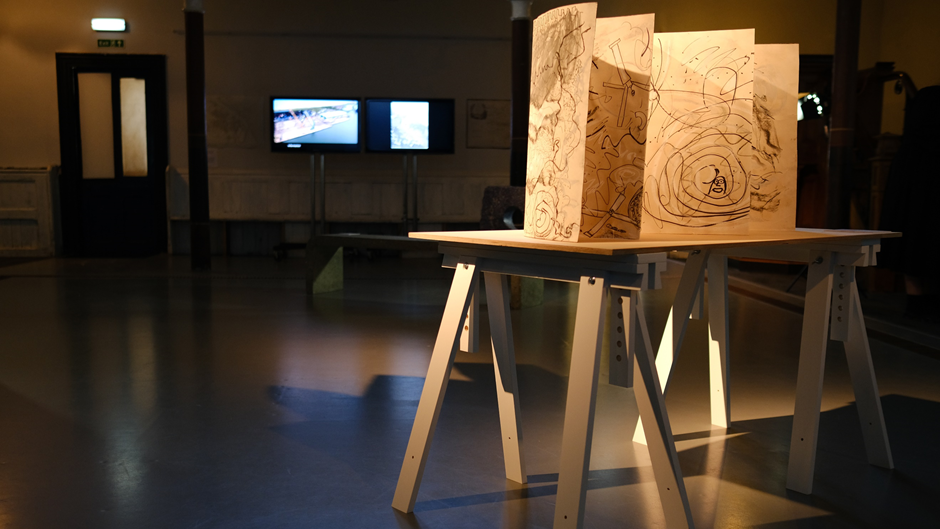From producing carbon to reducing it: How industrial change is affecting Blyth
9 August 2021 | By: Newcastle University | 2 min read
In this COP26 article, Anthony Zito, Professor of European Public Policy, discusses the ENERGIES Exhibition, which explores the reaction of the community of Blyth to changes in the industries based there - from carbon producing to carbon reducing.
This experimental project (the North East Coastal Community Resilience Project) has commissioned exciting new artwork from nine outstanding, regionally based artists and invited members of the North East coastal town of Blyth.
The project focuses on Blyth’s low-carbon energy and culture transformation. Understanding how communities respond to the demands to move to a net-zero carbon future is vital for building the foundation of further COP decisions.
Engaging with the community
The project has focused on Blyth as it has both an exciting future in the energy transition, and a very proud industrial heritage that will influence how its people embrace the future. The artwork expresses how the artists and the community see the Blyth industrial past linking to the transformation and the types of energy used to sustain both life and work.
The art prompts both the makers and the viewers to think and question what is happening. How the community itself sees, feels and communicates about this change is vital for shaping the Blyth community’s future and informing the adjustment that all coastal communities must make to adapt to the climate crisis.
Key findings
The project team’s engagement with the community has generated some important findings.
It is striking to compare the deeply embedded role the collieries in the Blyth area had in the various Blyth neighbourhoods before they closed, with the more general sense that many Blyth people have of the new energy developments happening in their midst, and the even more limited sense of the implications for themselves and their families and neighbours.
Greater communication and exchange between the community, those who govern and those who are building the new energy projects is vital for the well-being of all coastal communities. Allowing the community to express their dreams, concerns and fears through creative arts enables both the researchers and the wider world to more clearly grasp the views of Blyth and other coastal places.
 Lay of Blyth, Michael Cunliffe, www.dreamsofego.com
Lay of Blyth, Michael Cunliffe, www.dreamsofego.com
About the ENERGIES project
The interdisciplinary team for the ENERGIES project consists of Dr Clifton Evers (Exhibit Curator and Co-Investigator), Dr Mark Ireland (Co-Investigator), Dr Greg Mutch (Co-Investigator) and Professor Anthony Zito (Principal Investigator).
We hosted a physical exhibit of this work from 9-25 July 2021 at Headway Arts and the RePUBlic Gallery in Blyth, along with displaying work on the ENERGIES project website.
The project and exhibition have been supported by the Newcastle University ONEPlanet Fund, Newcastle Institute for Creative Practice, Headway Arts, NU School of Geography, Politics and Sociology, NU School of Arts and Cultures, Shadow Places Network, the Performance Research Network at Newcastle University, the RePUBlic Gallery and the HEAL Research Group. Dr Mutch was also supported by the Royal Academy of Engineering under the Research Fellowship Scheme.
Visit the ENERGIES project website to find out more and explore the online gallery.
COP26 provides a focal point for collective action on climate change. In our COP26 blog series, you can find out about some of the many projects related to climate change going on in the University and our wider community.
About Professor Anthony Zito
Anthony R. Zito is Professor of European Public Policy at Newcastle University, and is currently Co-Director of the Jean Monnet Centre for Excellence. His research has focused on governance, learning theory, networks, policy instruments, European integration and European Union decision-making. He has authored numerous journal articles and two monographs: Creating Environmental Policy in the European Union (2000) and Environmental Governance in Europe (2013, with R. Wurzel and A. Jordan).
Learn more about Professor Zito’s research and publications
Header image: The Stars by Allie Walton-Robson, photography by Frances Castle
